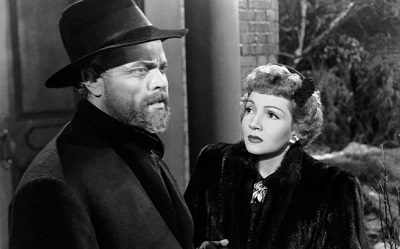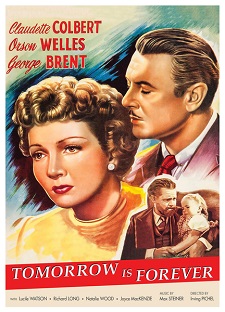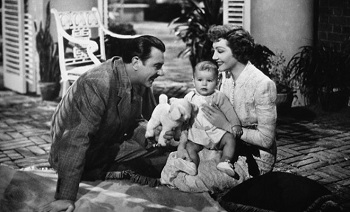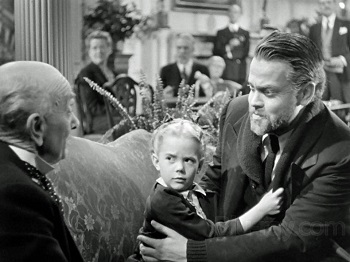
By Jeremy Carr.
It takes a sustained suspension of disbelief to accept what is tendered by Tomorrow is Forever. To permit the premise of this 1946 romantic drama, it is imperative for one to pardon its convoluted plotline and its unyielding dedication to coincidence. And fortunately, such is the quality of the film’s production, from its capable performances to the conviction of its narrative, this logical deferment is effortlessly and satisfactory achieved.
Written by Lenore J. Coffee, based on a story by Gwen Bristow, originally published in Ladies Home Journal (May 1944), this Irving Pichel-directed feature capitalizes on its many moments of melodramatic strain. These start almost immediately, as employees at the Baltimore-based Hamilton Chemical Works gather to celebrate the end of the Great War. Among the revelers are factory boss Lawrence Hamilton (George Brent), flaunting the war-winning industrial dynasty of the Hamilton family, and researcher Elizabeth (Claudette Colbert), who eagerly awaits word from her deployed husband, hopefully on his way home. The merriment is soon soured when Elizabeth instead receives notice that her husband has been killed in action. The news shatters her domestic ideal, a secure, proper, and pleasant temperament embodied so well by Colbert. Flashbacks magnify her pain, illustrating the erstwhile wedded bliss between she and John Andrew MacDonald (Orson Welles), who, upon enlisting, had convinced his wife he wouldn’t see action and would undoubtedly return (the latter a vow inadvertently fulfilled in the film’s central twist). A despondent Elizabeth, after she is revealed to also be pregnant – and this all within the first 15 minutes of the film – comes under the affably amorous care of Lawrence, who eases into her life with a genuine kindness and adoration. Years later, they are happily married, there are now two children – Drew (Richard Long), the oldest, and Brian (Sonny Howe) – and, most importantly, there is another world war on the horizon.
 Regarding Elizabeth’s unborn and, at that time, presumably fatherless son, it is said, “A man’s child is his future.” That attitude corroborates one of the key themes of Tomorrow is Forever, that of continuation, of endurance, and of investing in a future best suited to all involved, even if not everyone sees it right away. This notion is put into corresponding action when John, a broken man in intense agony, refuses to permit kindly German Dr. Ludwig (John Wengraf) to send word of his survival back to the states. He has no desire to subject his wife to what he has become; she thinks he’s dead and she’s all the better for it. It’s a curious conclusion, John taking it upon himself to decide that Elizabeth’s bout of temporary sadness is far preferable to a life of marital disappointment. But it works well in the film, for when John is eventually healed to the point of competency, he returns to America, with a five-year-old girl in tow, and, what is more, returns to Baltimore. And what is still more, he accepts a job as a chemist, under the foreign alias Erik Kessler, with Hamilton Chemical Works.
Regarding Elizabeth’s unborn and, at that time, presumably fatherless son, it is said, “A man’s child is his future.” That attitude corroborates one of the key themes of Tomorrow is Forever, that of continuation, of endurance, and of investing in a future best suited to all involved, even if not everyone sees it right away. This notion is put into corresponding action when John, a broken man in intense agony, refuses to permit kindly German Dr. Ludwig (John Wengraf) to send word of his survival back to the states. He has no desire to subject his wife to what he has become; she thinks he’s dead and she’s all the better for it. It’s a curious conclusion, John taking it upon himself to decide that Elizabeth’s bout of temporary sadness is far preferable to a life of marital disappointment. But it works well in the film, for when John is eventually healed to the point of competency, he returns to America, with a five-year-old girl in tow, and, what is more, returns to Baltimore. And what is still more, he accepts a job as a chemist, under the foreign alias Erik Kessler, with Hamilton Chemical Works.
Happenstance brings John into contact with Elizabeth, who fails to identify her first husband (he is now bearded, scarred, uses a cane, and has adopted an accent), but John is jolted straightaway by the encounter, and the viewer, still at just 30 minutes in, is left to anxiously anticipate how this unwitting reunion will play out. Coffee and Pichel extract considerable tension from the unexpected situation (unexpected for the characters, promptly foreseen by anyone watching the movie), particularly as John struggles to shoulder the realities of what he essentially left behind, while Elizabeth, with worries of her own, remains oblivious to who her husband’s new hire truly is.
Most of the credit for this riveting pull, however, has to go to Welles, here in just his third screen appearance since Citizen Kane (1941). He is the prevailing figure of identification throughout Tomorrow is Forever, given he knows more than the others and what happens next is largely his decision, but Welles’ inherent magnetism amplifies John’s discrete quandary. Placed in penetrating close-up, we are invited to examine every nuance of his face, looking for giveaways to suggest what he is thinking and what he might say. His ambiguous expressions are especially prominent, and especially touching, when John interacts with Drew, doing the math to realize how the boy’s age syncs up with his brief marriage to Elizabeth, looking in awe as his studious son ponders the state of contemporary geopolitics, and beaming with barely suppressed pride when his flesh and blood states a desire to join the Royal Air Force. Though he gives the best performance of Tomorrow is Forever, the downside to having Welles in this role – more so now than then – is that despite the facial hair and the cake of matured make-up, it’s hard to mask the icon’s distinctive features, and one is therefore left to wonder how Elizabeth can’t instantly recognize her spouse. Someone less conspicuous would have perhaps been more convincing, at least in terms of physical cover, but again, the film is so sincere and so dedicated to its cause, these minor squabbles are artlessly overlooked.
 If John is physically worse for wear, Elizabeth only grows more refined, revealing an outward polish synonymous with Colbert, who already savored three Oscar nominations as this point in her career, and a 1935 win for It Happened One Night (she had also appeared in The Man from Yesterday, 1932, which has a storyline rather similar to Tomorrow is Forever). Yet this distinguished front is upset by Drew’s zealous patriotism. When Elizabeth hears of war, she can only think of what took her husband away, a reaction made all the more awkward when she lashes out at the apparently Austrian Kessler by declaring, “A man like you killed my husband,” an assertion countered in a way, when it is revealed Kessler’s young companion, Margaret, is the daughter of Dr. Ludwig, who was himself killed by the Germans. The back-and-forth about America’s involvement in another European skirmish proves to be a pivotal source of antagonism for the principal characters, and yet another degree of intrigue for Tomorrow is Forever. The Bristow source took place as World War II was nearing its end (it was also set in and around the film industry), so the decision to change the period to just before America’s entry into the conflict makes for an advanced tackling of isolationist sentiment, most unusual for a post-war nation that was actually celebrating recent victories. Aside from supplying additional psychological torment, this historical alteration yields perceptive observations concerning the fallen and the war-wounded, how and to what extent would they be welcome in 1946 America, and how would one treat a peaceable expatriate like Kessler, who may trigger adversarial connotations.
If John is physically worse for wear, Elizabeth only grows more refined, revealing an outward polish synonymous with Colbert, who already savored three Oscar nominations as this point in her career, and a 1935 win for It Happened One Night (she had also appeared in The Man from Yesterday, 1932, which has a storyline rather similar to Tomorrow is Forever). Yet this distinguished front is upset by Drew’s zealous patriotism. When Elizabeth hears of war, she can only think of what took her husband away, a reaction made all the more awkward when she lashes out at the apparently Austrian Kessler by declaring, “A man like you killed my husband,” an assertion countered in a way, when it is revealed Kessler’s young companion, Margaret, is the daughter of Dr. Ludwig, who was himself killed by the Germans. The back-and-forth about America’s involvement in another European skirmish proves to be a pivotal source of antagonism for the principal characters, and yet another degree of intrigue for Tomorrow is Forever. The Bristow source took place as World War II was nearing its end (it was also set in and around the film industry), so the decision to change the period to just before America’s entry into the conflict makes for an advanced tackling of isolationist sentiment, most unusual for a post-war nation that was actually celebrating recent victories. Aside from supplying additional psychological torment, this historical alteration yields perceptive observations concerning the fallen and the war-wounded, how and to what extent would they be welcome in 1946 America, and how would one treat a peaceable expatriate like Kessler, who may trigger adversarial connotations.
George Brent does a fine job in Tomorrow is Forever, though he can hardly hope to compete with the likes of Welles and Colbert, both of whom have the more discernable screen presence and a legendary stature to boost their roles. Brent’s campaign, by comparison, befitting his character, is something of a peripheral aside, a decent man more akin to a bystander. Richard Long, on the other hand, makes quite an impression in his screen debut, conveying confidence and wisdom. And yet even that pronounced maturity can’t compare to seven-year-old Natalie Wood as Margaret. In her first credited role, Wood gives an amazing child performance; she is timid and wise, eloquent and fragile, sweet and evincing tremendous inner pain.
Tomorrow is Forever has been recently released on Blu-ray from ClassicFlix, and the disc’s lone supplement of note is an audio commentary by film score restorationist Ray Faiola, of Chelsea Rialto Studios. Throughout his track, Faiola conveys his musical expertise in a repeated appreciation of Max Steiner’s excellent score, he integrates excerpts from a radio broadcast of Tomorrow is Forever, and he disperses tidbits of information concerning the past and future credits of those involved, noting several points of trivia along the way (Wood was fluent in Russian, Welles wore a fake nose when playing the younger John).
 Most welcome is Faiola’s brief tribute to the understated qualities of director Irving Pichel. Pittsburgh-born and Harvard-educated, Pichel entered the film business by acting, but soon co-directed his debut feature, The Most Dangerous Game, in 1932 (it was Pichel, in fact, who first met young Santa Rosa resident Natasha Gurdin on the set of Happy Land in 1943, and was so impressed by the girl he later cast her in Tomorrow is Forever, after changing her name to Natalie Wood). As Faiola observes, Pichel’s straightforward methodology, seen to great effect here, stressed persuasive performances, narrative economy, visual proficiency (a poignant depiction of seasonal flux, and what those seasons represent to the characters), and the leveling of material tone, which could have easily veered toward the heavy-handed.
Most welcome is Faiola’s brief tribute to the understated qualities of director Irving Pichel. Pittsburgh-born and Harvard-educated, Pichel entered the film business by acting, but soon co-directed his debut feature, The Most Dangerous Game, in 1932 (it was Pichel, in fact, who first met young Santa Rosa resident Natasha Gurdin on the set of Happy Land in 1943, and was so impressed by the girl he later cast her in Tomorrow is Forever, after changing her name to Natalie Wood). As Faiola observes, Pichel’s straightforward methodology, seen to great effect here, stressed persuasive performances, narrative economy, visual proficiency (a poignant depiction of seasonal flux, and what those seasons represent to the characters), and the leveling of material tone, which could have easily veered toward the heavy-handed.
With cinematography by Joseph A. Valentine, himself a four-time Oscar nominee and winner for Joan of Arc (1948), Tomorrow is Forever is orderly and tasteful, deftly handled and ultimately resolving in a surprisingly mature dénouement. For all of its melodramatic trappings and its adherence to constant coincidence, Tomorrow is Forever takes the perpetual refrains of familial sacrifice and offers up a conclusion that is neither completely happy nor entirely sad, but rather one that is realistic, rational, and, like the film in general, wholly fulfilling.
Jeremy Carr teaches film studies at Arizona State University and writes for the publications Film International, Cineaste, Senses of Cinema, MUBI/Notebook, Cinema Retro, Vague Visages, Cut Print Film, The Moving Image, Diabolique Magazine, and Fandor.
